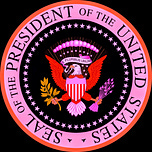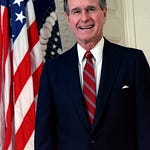He was born in Nebraska and named Leslie Lynch King, Jr. after his father, but his parents' marriage didn't last. His mother moved to Grand Rapids, Michigan and remarried Gerald R. Ford, who adopted Leslie and renamed him Gerald R. Ford, Jr. The boy learned the truth of his parentage at around 12. He loved his stepfather.
He and mother had three rules: tell the truth, work hard, and come to dinner on time, and woe unto any of us who violated those rules.
He served in the House of Representatives for 24 years, rising to House Minority Leader. His ambition was to be Speaker of the House. But instead, he was appointed to the vice presidency after Spiro Agnew resigned in disgrace. Ford immediately found himself tasked with defending President Nixon in the mounting Watergate scandal.
Critics charged that in my speeches and press conferences I was "zigzagging" all over the lot and taking positions that seemed contradictory. There was some truth to that.
Then came the day when Alexander Haig told him that Nixon would soon hand over secret tapes that would likely lead to his downfall.
He hadn't seen the evidence himself, Haig said, but he'd been told about it by people who had. They had explained that it contained the so-called smoking gun, and he felt sure that they were telling the truth.
Jerry had honestly believed in Nixon's innocence.
Throughout my political life, I always believed what I was told. I was truthful to others; I expect others to be truthful with me. . . We had been friends for twenty-five years. We had campaigned for each other, and there had never been a time when I felt he wasn't telling me the truth.
He told Betty about the Watergate tapes.
She had long shared my view that everything we'd been told by the White House was truth. Now the story was falling apart, and she was dumbfounded.
To everyone's surprise, Nixon continued to defend himself.
"Whatever mistakes I made in the handling of Watergate, the basic truth remains that when all the facts were brought to my attention, I insisted on a full investigation and prosecution of those guilty."
But when Republican senators told him they would vote to impeach him, Nixon agreed to resign. Ford called Democratic Majority Leader Tip O'Neill to let him know.
For a moment, neither of us spoke. Then he sighed. "Christ, Jerry, isn't this a wonderful country? Here we can talk like this and you I can be friends, and eighteen months from now I'll be going around the country kicking your ass in." That, I thought, was one hell of a way to speak to the next President of the United States. But it was vintage O'Neill, and it contained a large measure of truth.
After being sworn in as President, he asked the nation that hadn't elected him "to confirm me as your President with your prayers." He also said:
"I believe that truth is the glue that holds government together, not only our government, but civilization itself."
Then he had a mere few weeks to put together an administration and a Cabinet.
I wanted men and women who would give me unvarnished truth, then lay out the options for decisions that I would have to make.
In his first address to Congress, he assured them he was his own man. Or rather:
"I am your man, for it was your carefully weighted confirmation that changed my occupation. The truth is, I am the people's man, for you acted in their name."
His immediate concern was to trim the government budget.
It's discouraging how hard it is for a President to slice away large chunks from a $305 billion budget. He might want to, but the truth is he can't.
Nor, he insisted, was the burgeoning deficit the result of defense spending.
Nothing could have been further from the truth. In 1959, we were spending 40% of the budget for national defense. By 1974, that figure had declined to 24%.
But he also quickly made the controversial decision to pardon former President Nixon--a decision he kept from his own press secretary until it happened.
If I informed him of the decision and reporters asked him whether or not a pardon was in the works, he would either have had to lie and violate the pledge of openness and honesty he'd given his former colleagues, or have had to tell the truth. And public revelation of the truth--before the proper groundwork had been laid--could have been disastrous.
After the press secretary resigned in protest, the new acting press secretary was put on the spot.
Reporters asked Jack Hushen if I was planning to grant a blanket pardon to Nixon's former aides. 'I am authorized to say that this entire matter is now under study,' he replied. The truth is that I had not authorized him to say anything of the sort.
The deference shown to a president went against Gerald Ford's humble, Midwestern nature.
You can tell them you want the blunt truth; you can leave instructions on every bulletin board, but the guarded response you get never varies.
He was also frustrated by the endless questionings of his own veracity, with Democrats insisting he must have pardoned Nixon in exchange for the presidency. He testified before Congress to deny it. Democratic Representative Elizabeth Holzman refused to believe him.
Soon it became obvious that nothing I could say would ever satisfy her. After expressing her 'dismay' that 'the format of this hearing will not be able to provide the American people the full truth' about the pardon . . . she said everyone wondered whether or not there had been a deal.
Angrily, he insisted there had been no deal. But he had "stagflation" and a looming recession to address.
Admitting the truth is one thing. Coming up with plans to deal with it is another.
He had inherited so many problems. But he loved the job.
The truth is, I couldn't wait to start the day.
He was eager to begin unwinding the "Great Society." But the Democratic Congress continued to send him huge spending bills.
The Democrats . . . had accused me of "obstructionism" when I had used the veto to block some of their irresponsible spending schemes. But the truth is that I had no other tool to use.
He withheld federal funds from a near-bankrupt New York City, prompting the Daily News headline "Ford to City: Drop Dead."
I had not understated the city's problems. Nor had I exaggerated them. I had simply told the truth.
His wife Betty told the truth as well, admitting in a television interview that her children had "probably" tried marijuana, and that she believed Roe vs. Wade was "a great, great decision." Conservatives blew their stacks. Jerry supported her, just as he supported CIA head Bill Colby's admissions before Congress about the extent of the CIA's domestic spying.
I supported his decision to tell the truth about past agency misdeeds even though both of us recognized that this testimony would be embarrassing.
But the truth could not save him. The fall of Saigon, while cued up by Johnson and Nixon, happened on his watch. He recovered the crew of an American container ship hijacked by the Khmer Rouge, but at the expense of near 40 Marines. He made progress on arms reduction talks with the Soviets, but the hard right saw this as weak. So in the 1976 presidential primary, he faced a challenge from the right by Ronald Reagan.
He made some ridiculous new charges. I had fired Jim Schlesinger as Secretary of Defense, he said, because I was afraid to tell the American people "the truth about our military status."
He came close to losing the primary, especially after his campaign director, Bo Callaway, was accused of backroom dealing.
Bo, I knew, was telling the truth. Yet at the same time I realized that keeping him as campaign director would create problems. . . His reputation lay in shreds and it would have remained there had not Harper's come forth with the truth.
Ford's aides begged him to play hardball with Reagan as the California governor mopped up primaries with the incumbent. Ford did his best to fight back.
Now in speeches and at press conferences I singled him out, and while not directly accusing him of maligning the truth, I took specific issue with his "misleading statements."
He barely eked out a win against Reagan, and then faced Democrat Jimmy Carter in the general election. He attempted, again, to own the truth.
"The question in this campaign of 1976 is not who has the better vision of America. The question is who will act to make that vision a reality. The American people are ready for the truth, simply spoken, about what government can do for them and what it cannot do and what it should not do."
He mistakenly thought it a gift when Carter, in an interview in Playboy, admitted to having "looked on a lot of women with lust." But Americans liked Carter's raw honesty. And Carter somehow used the claim to score political points.
"Christ says don't consider yourself better than someone else because one guy screws a whole bunch of women and the other guy is loyal to his wife. I don't think I would ever take on the same frame of mind that Nixon or Johnson did--lying, cheating, and distorting the truth."
Carter kept grabbing the truth from Ford, even though Ford's brand was integrity. Jerry had been sullied by his connection to the Nixon administration, and investigations, though they never found anything damaging, kept popping up. Carter gleefully used them.
"I call on the American people to force Mr. Ford to tell the truth, the whole truth and nothing but the truth. I call on the American news media to insist that Mr. Ford be cross-examined in a carefully prepared, open, previously announced news conference."
Gerald Ford never really understood how it was that he lost, how he remained the only American president who was never elected to national office.
I was angry at the Democrats for distorting the truth.
The word "truth" appears 32 times in Jerry Ford's autobiography. A nondescript man from "Bland Rapids," he lacked charisma, he lacked political genius, he lacked bloodthirstyness. The one thing he had in spades was honesty. But Ronald Reagan and Jimmy Carter stole truth from him. At least that's how he perceived the problem. He didn't understand the real problem: in politics, there no longer was a truth. Or rather, the truth didn't matter. Which isn't exactly the same thing -- but it might as well be.
* Every appearance by my own count. Google books counts 38, but this may include words such as "truthful" or "untruth." All quotes from A Time the Heal: The Autobiography of Gerald Ford (1979).














Share this post